Editor's Note
Dear Readers,
Hello and welcome to the first edition of The Bold Magazine! Originally, our first magazine was going to center around all topics related to “how to survive college” for incoming first-year students. However, given the constant changes that students are experiencing as a result of COVID-19, we have decided to make the “college survival” theme ongoing. College students today, no matter what year they are, are all figuring out how to be a student during a global pandemic. The Bold Magazine aims to be there with you, offering useful information and insightful stories that can help make this process a little easier.
 Every other week, we will publish a short magazine that features information around a central topic, ranging from the environment to getting involved on campus to professional development. Our first edition focuses on the experience of first-year students, offering information on how to start the year “On the Right Foot.”
Every other week, we will publish a short magazine that features information around a central topic, ranging from the environment to getting involved on campus to professional development. Our first edition focuses on the experience of first-year students, offering information on how to start the year “On the Right Foot.”
As editor-in-chief of the magazine, it is my ultimate goal to provide you, the reader, with information and stories that help you understand topics a little bit better and feel more connected to the Boulder community. I want this magazine to feel like an interactive platform for you, because that’s who it’s meant for.
So please feel free to suggest new ideas and topics you would like for us to cover; questions you want us to ask; people and organizations you think we should know about; whatever is most pressing to you. You can email The Bold Magazine at thebold@colorado.edu or you can email me at tayler.shaw@colorado.edu.
As I have worked with such incredible storytellers for this magazine, I have described the experience as exciting and terrifying. I want to make this publication the best it can be, and I want to make our community proud. If you’re interested in storytelling and have a story that you want to tell, please contact me. I’d love to have you on board.
In the meantime, I hope you enjoy our first magazine edition!
Cheers,
Tayler Shaw
A survival guide to living with a roommate
By: Piper Vaughn
One of the first college experiences most students have is living with a roommate, which can be a big adjustment. This year, students like you will have to navigate this change while keeping yourself and others safe— something unprecedented with the rise of COVID-19. This feeling of uncertainty can be overwhelming and scary. I, too, was once a very intimidated but excited freshman coming into CU Boulder last fall. With all the changes happening this year, I’ve put together a roommate survival guide that will show you how to communicate with your roommate, stay safe and still have a fun college experience.

The first few weeks of living with a roommate can feel weird and awkward, especially when you weren’t able to select your roommate; but you can still come out with a great roommate experience, just as I did, and grow a lot from it. The key is communication, and your roommate agreement is one way to start the conversation about the expectations for your living arrangement.
The roommate agreement is a form on the Roompact portal that requires both yourself and your roommate to fill out information about your living preferences. It is normal to feel uncomfortable when talking about your boundaries and expectations for living with another person. However, having these conversations is especially important this year.
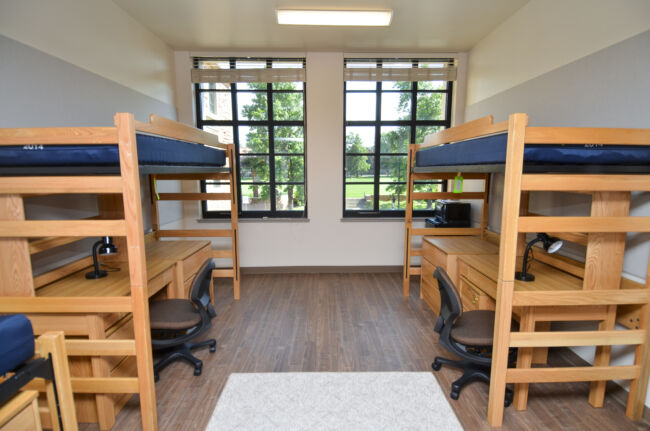
Due to CU Boulder reducing the number of students living in residence halls, there is limited space on campus and the likelihood of being able to change roommates has decreased. Odds are that you will be with the same roommate as long as you are living in the residence hall, making it even more important to communicate with your roommate from the very beginning.

“So here’s the tricky part, there won’t be space…so I think it’s going to be really important for folks to communicate, right? Cause that’s the biggest issue is unspoken expectations,” says Crystal Lay, the director of residence life at CU Boulder. “…People have to be ridiculously clear about what their expectations are.”
When I had to fill out a roommate agreement form, my roommate and I did not take it seriously at all. We wrote vague things like “be nice,” and “don’t steal each other’s stuff.” However, with the changes COVID-19 has brought, I highly encourage you to take this seriously and voice your concerns now rather than when it becomes a problem in the future.
Lay explains that the questions and topics included in the roommate agreement are based on common roommate issues that can lead to conflict, such as how often visitors can come to the room, sleeping schedules and personal hygiene in relation to COVID-19. This is a great tool for you and your roommate to reflect on if conflicts arise, so be specific.
According to Colin Johnson, a conflict resolution coordinator at CU Boulder, he recommends “using that roommate agreement as a guide to kind of have conversations with one another, and be as transparent and honest with one another as possible.”
Johnson suggests viewing the roommate agreement as a living document that you can revisit in a month or so when you get more comfortable with your roommate and living situation.
If conflict arises between you and your roommate, it is important to know that conflict is “important and natural,” according to Johnson. Johnson views conflict as similar to a fire: while it can be really harmful if not put out, it is also vital to our survival by helping us cook and keep warm.

When addressing conflict, Johnson recommends you discuss the personal impact something has had on you by using “I” statements and describing how you feel, when you feel that way, why you feel that way and what alternatives would work for you.
“I always advise folks— especially when we’re talking about safety, health, you know, boundaries, something like that— providing ‘the why’ is one of the most important things you can do,” says Johnson. “Being able to provide that ‘why’ around anything, and not just around COVID but around any kind of conflict, I think is one of the most important things you can do because you can argue beliefs…you can argue opinions, but it’s really challenging to argue against somebody’s experiences and somebody’s feelings.”
While it is important to address the feelings and experiences you are having, Johnson explains that it’s also critical that you listen and have empathy.
“I think most people don’t want to make other people unhappy or uncomfortable,” says Johnson. “And so if roommates are differing around social distancing, I think that’s where empathy and listening need to come in, so they can have conversations with one another and work together to kind of find some sort of solution that works for both of them.”
If the conflict is severe and no resolution seems possible, you can bring a third party in— a person who is unbiased and someone you can trust, such as an RA, a hall director or a staff member from the conflict resolution office— to help mediate.
The biggest piece of advice that Johnson offered was to “approach conflict with curiosity” and to wonder “not what’s wrong with this person, but what has happened to this person and what has this person been through.”
Remember, conflict is not always a bad thing; even though it may be challenging in the moment, it can also be a beneficial tool that will make you and your roommate grow stronger in the long run.
So let’s talk about living in a dorm and remaining safe during a global pandemic. One of the biggest adjustments that CU Boulder has made is the transition to creating academic cohorts, otherwise called a “First Year Academic Cohort” (FYAE), that exist in most residence halls across campus. These academic cohorts are smaller communities within the residence hall that are often associated with your major. For example, as Lay describes, English majors would be mostly living with other English majors.
The idea behind academic cohorts relies on living and learning with peers, strengthening your academic and personal relationships. Part of the reason for this change is to help assist in contact tracing for COVID-19 in the case that someone tests positive, with the hope that the number of people the person came into contact with will be limited to mostly people within the same residence hall and not throughout all of campus.
“The nice part is that even though you are in a cohort, you will have the opportunity to socialize with other students, obviously through virtual platforms or digital platforms,” says Lay about the ability of students in different majors to connect with one another. “But the cohorts are designed to help with some tracing pieces to help people build a community.”
With the additional regulations put into place to help prevent the spread of COVID-19, it is important that you also talk with your roommate about what rules or boundaries you want to set for your room. If you or your roommate think that you have symptoms of COVID-19, it is crucial that you keep our community’s safety in mind.
- Symptoms can include a cough, fatigue, fever, vomiting and a loss of taste, among others.
- If symptoms occur, stay in your room and let others know that you are experiencing symptoms.
- You can contact your RA, call CU Boulder’s Medical Services Nurse Line at 303-492-5101 or call your own physician to get yourself tested.
In an effort to help monitor residents living in residence halls, the university requires that all staff, faculty and students fill out a daily health form before coming to campus. Students who live in residence halls are also required to get a weekly, saliva-based COVID-19 RT-PCR monitoring test.
“We want folks to think of this as ‘How do I not just protect myself, but other people and the community,’” says Lay. “And so if I am not feeling well, I think I have a responsibility to the people around me to take care of myself.”
Now, more than ever, communication with your community and your roommate is an important step towards having a successful year. Let us all watch out for the Boulder community, while still having a great and safe semester in your residence hall.
What was it like to fill out your roommate agreement?
What are the COVID-19 policies within the residence halls?
By: Tayler Shaw

- Masks: Residents are required to wear a cloth face covering that extends over your mouth and nose any time that you are outside of your room, including when using the bathroom. The exception to this is when a resident is using the shower or brushing their teeth.
- Accomodations: If you need an accommodation, you can contact CU Boulder’s Disability Services at dsinfo@colorado.edu or 303-492-8671 for medical accommodations or the Office of Institutional Equity and Compliance (OIEC) for religious accommodations at cureport@colorado.edu or 303-492-2127.
- Social distancing: Residents are expected to practice social distancing (meaning that you are 6-12 feet away from other people) whenever you are inside the residence hall.
- Visitor policy:
- A visitor is defined as another person who lives in the same residence hall as you do. For example, if you live in Sewall Hall, then a visitor would be another resident who lives in Sewall Hall.
- You must get your roommate’s permission before inviting a visitor into the room; visitors cannot stay in your room if you are not there with them.
- You and your visitor must wear a mask at all times, even when you are within your private room.
- Room capacity— no more than double the room occupancy is allowed, meaning that a single room can have up to two people within the room at one time and a standard double room can have up to four people within the room at one time.
- Guest policy:
- A guest is defined as a person who does not live in the same residence hall as you. For example, a resident in Sewall Hall is considered a guest at Darley North Hall.
- Guests are not allowed in resident rooms, nor in the hallways, study rooms or lounges associated with the floor that residents are living on.
- Guests are allowed in the lobby area of the building as long as they are wearing a mask, practicing social distancing and are accompanied by a resident of the building.
- Staying overnight: No overnight visitors or guests are currently allowed within residence halls.
- Lobby occupancy: No more than 10 people are allowed within an area at one time, including the lobbies.
- Daily Health Form: All faculty, staff and students who come to campus, including students who live in the residence halls, are required to fill out a daily health form that inquires if you are feeling any symptoms of COVID-19.
- Weekly screening test: Residents who live on-campus are required to take a saliva-based, RT-PCR monitoring test at a testing location near their residence hall. Residents should have received an email with a designated day to take their test. Residents can sign up for an appointment online and will be contacted afterwards via email only if the test indicates the student should take a diagnostic test.
- A diagnostic test can be taken at the Public Health Clinic (PHC) at Wardenburg Health Center.
- All residents are expected by CU Boulder to follow the public health guidelines both on- and off-campus. This includes not attending parties or gatherings that exceed more than 10 people, and new violations and sanctions for students caught hosting or attending such gatherings were recently announced in an administrative eMemo.
Potential consequences:
- The consequences of not completing the weekly screening test were described in an email sent by “Student COVID-19 Monitoring” on Sept. 7, 2020: “If you do not participate you are in violation of your housing contract. Failure to participate can lead to additional consequences.”
- Resident Advisors (RA’s) are required to report any COVID-19 violations they see within and immediately surrounding the residence halls and to formally document what happened and who was involved. That report is then sent to the office of Student Conduct & Conflict Resolution at CU Boulder for review. Click here for more information on the student conduct process.
Home in the mountains: How a love for the outdoors helped me find community and belonging
By: Nicole Cattin
My family and I spent my mom’s 52nd birthday decorating my dorm room in Buckingham Hall. My mom’s only birthday wish that year, in 2016, was that I would have a successful first year of my college career.
A few days prior, we had filled the largest duffel bags that Southwest Airlines would allow with the contents of my teenage bedroom and flew across the country. I went to a huge high school with two separate campuses, in two separate towns in the suburbs of Chicago and graduated with more than 1,000 students. Because I attended such a large high school, I knew I wanted a bigger university and hoped to find my home at CU Boulder through doing extracurriculars, similar to what I had done in high school.
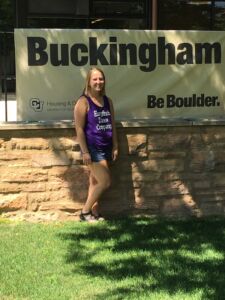
The Stampede Leadership Camp, a program that allows incoming first year students to participate in and volunteer for on-campus activities, was my first attempt at finding this home. As a participant, I arrived on campus a week earlier than most. Through Stampede, I became involved in the Residence Hall Association (RHA) and Buckingham Hall Council— two more attempts to find a home on-campus.
I managed to find a group of friends like I had hoped for, but they lived outside of my dorm. Not that there is any problem with that, but I had just dreamed of that typical college experience where you are best friends with everyone on your floor and you do everything with your roommate. However, after the first two weeks of college, I began experiencing some difficulties with my roommate, and I felt like my dreams of having the perfect college experience had been crushed.
I ended up changing rooms and had to make a new space feel like home, this time without the help of my parents or the birthday celebration. I packed up the life I had created during those first few weeks of college and moved across the building into a new room and with a new roommate. Even the bathroom was an adjustment, because now I was sharing it with three girls (my roommate and two suitemates) instead of the whole floor; strange as it seems, the community bathroom was where a great deal of bonding occurred.
When I finally settled in, I tried to foster that dream relationship with my roommate and suitemates; but with different interests, sororities and sports, I had to admit to myself that this wasn’t going to be the perfect experience either. And that’s when it set in. I began to regret the celebration of my mom’s birthday in my dorm room, simply because I wasn’t holding up my end of the birthday wish.
For a month straight, I watched college admissions videos from other universities like it was a Netflix series. My dad begged me to wait it out, reassuring me that life was never going to be perfect like those movies we have all seen. He reminded me of all the fun that we had in Colorado together; all of the laughs that we had when we took a snow biking lesson; all of the hours we spent in ski traffic just so we could get a single powder day in each season; and all of the resorts he still wanted to come ski with me.

I promised him I would attempt to find my home with a group of students who loved the mountains as much as I did. When that first ski season came around, I was on every CU Ski Bus— twice a weekend, every weekend. Sometimes I went with friends, but most times I went without. I started recognizing others on the bus. I never got their names, but I could spot their jacket-and-pants combination from a mile away. I knew from that first bus ride that I had found my people. I continued to ride the CU Ski Bus until the end of the season, and then I would take anyone up on a ride to Arapahoe Basin just so I could ski some more. Despite the lack of names to show for finding my home, I knew that CU had a spot for me and that if I continued to spend time doing what I loved, that home would grow.
If I had continued to watch my freshman year version of Netflix, I would have never had the opportunity to later intern at Warren Miller Entertainment, a ski film production company during their 2019 tour of “Timeless.” I would have never met the fantastic faculty members that knew my love for the outdoors and helped me apply it to any project possible. I would have never met the guys behind RovR Products, a local high-end cooler company, where I interned and designed a hang tag for their latest product that is now in a number of REI stores across the country; nor would I have gotten my first full-time job with them after graduating from CU Boulder in 2020.
While there are plenty of “what-ifs” regarding what my life would have looked like if I had stayed in the Midwest, those faded from my mind when I found my home; if someone were to create a movie regarding my dream life, it would look pretty similar to exactly this.
Greek life: Advice on rushing a fraternity
By: Nicholas Kohler
So you are interested in rushing a fraternity at the University of Colorado Boulder?
Depending on who you ask and definitely depending on who is in your circle, Greek life can be a significant or a minute part of campus life. For some, Greek life equates to the ideal college experience. For others, it simply is a nuisance. While there are many students at CU Boulder who are not involved in Greek life, for those who are, it can be a formative experience.
Fraternities have a rather checkered history at Boulder. Many of the fraternities at CU Boulder have been kicked off campus at least once since their founding. However, they also provide philanthropic elements and can help make a university of 30,000 feel significantly smaller. Regardless of their benefits and deficits, there are three “types” of social fraternities at the university.
First, there are those fraternities that are affiliated with the university. Consisting of seven fraternities, the University of Colorado Boulder Interfraternity Council (IFC) is the most recent addition to Greek life. This IFC hosts seven different fraternities. CU Boulder lists a plethora of benefits for fraternities that partner with the university’s IFC. Here is a list of all of them.
The main benefits of associating with CU Boulder boil down to two things: being allowed to use the university’s resources and being able to officially partner with sororities. However, it’s important to note that unaffiliated fraternities also partner with sororities outside of university-related activities, so university-affiliated fraternities are not the only ones that hang out with girls.
This brings us to our second group: the IFC on the Hill. Officially titled the Undergraduate Interfraternity Council at the University of Colorado, the IFC severed ties with CU Boulder in 2005, essentially signifying that the fraternities are no longer affiliated with the university. Currently, the IFC represents 22 different fraternal organizations ranging in size and is the largest group of Greeks.

Finally, there are two fraternities, Kappa Sigma and Sigma Pi, who are not affiliated with either CU Boulder or the IFC on the Hill. However, these fraternities are nationally recognized. Because of this recognition, they do report to their nationals– the international organization that oversees all chapters of the fraternity.
Forest Coon, the president of Kappa Sigma, elaborates, “We still do comply with rules and we are still regulated. We just have to report to our nationals as opposed to a third party on campus, which is the IFC. We don’t have to pay the extra IFC fees. They don’t regulate what we do, but when it comes to rush and when it comes to being a pledge and stuff like that, it is very, very on par with everyone else.”
Now, normally all three groups will rush at the same time in order to ease the burden on rushees; however, in the COVID-19 era, each group will be handling the rushing process differently. The CU Boulder IFC plans on rushing virtually, while the IFC on the Hill is allowing each fraternity to handle the rush process differently. Regardless of the format of rushing, the end goal still remains: to find the brotherhood that’s right for you.

Rushing is a fancy term for man-flirting. You, a rushee, will visit houses (virtually or not) when they are “open” to see if you fit in with the brothers, or official members, in the house. Basically, you go have a conversation with the brothers and see if they like you, and more importantly, if you like them.
I want you to remember that last point. A fraternity is a commitment for as long as you want it to be. For most, it is a lifetime commitment. This brotherhood is something that you should be proud of sharing, associating with and being a part of. So as you rush, don’t just ask about parties or girls or activities; ask about philanthropy, ask about grades, ask about brotherhood. Because in the long run, these all matter. Ultimately, the choice is yours: where do you belong?
“We all wanted the opportunity to meet people different from ourselves and establish a community of brothers,” explains Arthur Didinsky, president of Sigma Alpha Mu, when asked why he and his brothers decided to rush.
Is your reasoning for rushing similar? Maybe you are like Tyler Nichols, president of Sigma Tau Gamma, who felt a draw to Greek life because of his family history with it.
Scott Albertoni, president of Beta Theta Pi, describes the benefits of rushing: “I can honestly say I am not the same person I was when I first got to college. The conversations, education and leadership experience I have gained while being in a fraternity is something I haven’t found anywhere else on campus.”
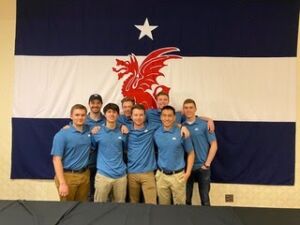
The growth Albertoni described is just one of the reasons many students decide to rush. Each person has his or her own reason to rush. And at CU Boulder, there are houses that cater to those reasons. So you can take it from me or take it from the presidents I interviewed: authenticity matters. The goal is not to become a brother at the perceived coolest house on campus or the house that throws the best parties, but to find a group of people, or brothers, that you can associate with the rest of your life.
Forest Coon explains, “The most important thing someone rushing should know, in my opinion, is to explore a variety of houses and while doing that, to be true to themselves. I know that is corny but like I previously said, if the rushee is acting ‘fake’ then they will most likely be disappointed in their final placement.”
Greek life is not without its controversies, but during COVID-19, Greek life affords an outlet.
“Now, more than ever, Greek life presents the opportunity to connect with the CU Boulder community,” describes Didinsky.
Greek life: Advice on rushing a sorority
By: Piper Vaughn

Greek life can be intimidating on a good day, let alone with a global pandemic going on. But for me, regardless of how scary it was to push myself out of my comfort zone, I knew it was something that I wanted to do. It allowed me to branch out and meet new people who I never would’ve met in the dorms or in classes. I know this is cliché, but I truly found my friends through Greek life.
As far as the 2020 fall rush will look like, it will be on a completely virtual platform. However, it will still be interactive and allow you to get to know other girls and different aspects of Greek life. There are a variety of houses and people to interact with, allowing you the chance to find the best fit for you.

Grace Naber, a recruitment counselor this year, talked about the importance of values-based recruitment.
“As recruitment counselors this year, we have done various exercises in order to identify our personal values and we want to encourage you to identify yours,” says Naber. “Going through recruitment with your values and passions identified will help you join a house with like minded people.”
“For example, say you are passionate about honesty or helping others, or you have a passion for a specific kind of philanthropic work; ask questions and identify if the houses you are interested in have the same values,” Naber continues. “This will ensure you end up where you need to be!”
In my experience, going through recruitment and joining a sorority helped me make friends and branch out more. It also gave me the opportunity to participate in so many exciting events and activities with the girls in my sorority. Without rushing last year, I would not have met the girls I now call my best friends, and I would not have had such a great time here at CU.

For Sophie Campbell, a sophomore involved in Greek life at CU, she also wanted to rush to find that sense of community.
“I wanted to be involved with CU’s community and make a big school feel a little bit smaller,” says Campbell. “Being a part of a sorority not only has given me a whole house full of friends, but also now I have connections with girls in different houses too.”
When it comes to advice for first-year students, Campbell recommends making as many connections as possible.
“One tip I have for incoming freshmen during rush is to use the opportunity to meet as many girls as possible,” says Campbell. “I am still super good friends with a lot of girls that I rushed with and they are all in different houses.”
While the rushing process for me offered a great opportunity to meet new people and find a community, not everyone will have the same experience. If you get “dropped” by a house you originally wanted, that is OK! Trust the process, and you will end up where you are meant to be. Whether it is in Greek life or not, with over 500 student organizations on-campus, you can find a community at CU.
- Alpha Chi Omega
- Philanthropy: Partners and Prevention
- Motto: “Together let us seek the heights” & “Real. Strong. Women.”
- Nickname: A Chi O
- Alpha Phi
- Philanthropy: Alpha Phi Foundation
- Motto: “Union hand in hand”
- Nickname: A Phi
- Chi Omega:
- Philanthropy: Make-a-Wish Foundation
- Motto: “Sisters on Purpose”
- Nickname: Chi O
- Delta Delta Delta:
- Philanthropy: St. Jude Children’s Research Hospital
- Motto: “Let us steadfastly love one another”
- Nickname: Tri Delt
- Delta Gamma:
- Philanthropy: Service for Sight
- Motto: “Do Good”
- Nickname: DG
- Gamma Phi Beta:
- Philanthropy: Girls on the Run
- Motto: “Founded upon a rock”
- Nickname: G Phi
- Kappa Alpha Theta:
- Philanthropy: Court Appointed Special Advocates (CASA)
- Motto: “Leading women”
- Nickname: Theta
- Kappa Kappa Gamma:
- Philanthropy: Reading is Fundamental
- Motto: “Dream Boldly, Live Fully”
- Nickname: Kappa
- Pi Beta Phi:
- Philanthropy: Read, Lead, Achieve
- Motto: “Promote friendship, develop women of intellect and integrity, cultivate leadership potential and enrich lives through community service.”
- Nickname: Pi Phi
- Phi Mu:
- Philanthropy: Children’s Miracle Network
- Motto: “The Faithful Sisters”
- Nickname: Phi Mu
Magazine Contributors
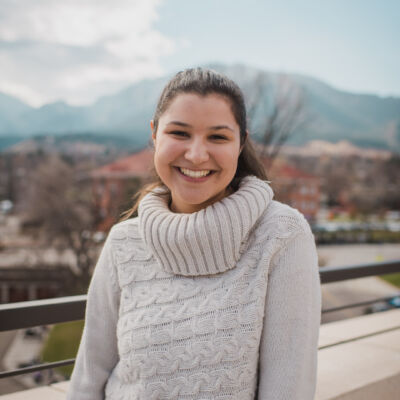

Nicholas Kohler is a senior majoring in journalism with minors in sports media, art history and business. His interests include sports, reading, movies and socializing. He is a member of the fraternity Pi Kappa Alpha. He also is the journalism chair of the Senior Class Council.
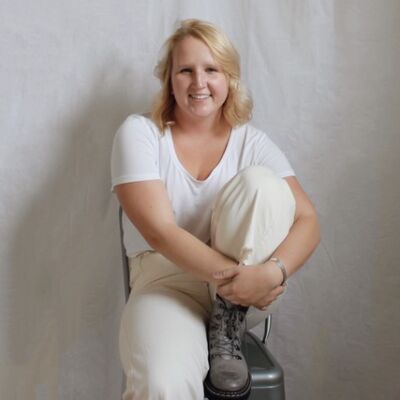
Nicole Cattin graduated from the College of Media, Communication and Information in May of 2020 with a degree in strategic communication and minors in business and technology, arts and media. She currently lives in Boulder, Colorado and works for RovR Products, and she still is an avid skier.

Piper Vaughn is from Castle Rock, Colorado, and is a senior majoring in journalism with a minor in english. Vaughn is the Arts and Entertainment editor and will also be taking on The Bold’s new video section! She enjoys her dog, spending time with friends and family and loves to run. Piper has been involved in several organizations including The Bold, CMCI Honors Program, NewsTeam Boulder, Alpha Phi, and was a fellow for News21 in Phoenix, Arizona.

